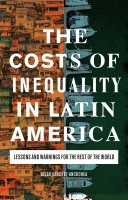The Costs of Inequality in Latin America – Lessons and Warnings for the Rest of the World

Blurb
From the United States to the United Kingdom and from China to India, growing inequality has led to social discontent and the emergence of populist parties, also contributing to economic crises. We urgently need a better understanding of the roots and costs of these income gaps. The Costs of Inequality draws on the experience of Latin America, one of the most unequal regions of the world, to demonstrate how inequality has hampered economic growth, contributed to a lack of good jobs, weakened democracy, and led to social divisions and mistrust. In turn, low growth, exclusionary politics, violence and social mistrust have reinforced inequality, generating various vicious circles. Latin America thus provides a disturbing image of what the future may hold in other countries if we do not act quickly. It also provides some useful lessons on how to fight income concentration and build more equitable societies.Book summary
This book highlights the political economy of wealth and income inequality in Latin America. The author segments his analysis to separately evaluate the economic, social, and political costs of inequality building on country case studies. It draws well-contextualized lessons from the Latin American experience that is important to consider for other regional contexts, especially for social policies of nations within the 'Middle Income Trap'. This book, therefore, serves as a non-technical introduction to the key policy issues surrounding inequality that is suitable for a general audience. It will, however, also be of interest to specialists in the field given the author's rich use of case study evidence and their reframing of the discussion in the context of contemporary populists politics and the Covid-19 recovery.
Comment from our editors:
This book serves as a well-written account of the long-term damaging effects of wealth and income concentration in Latin America. The author does a great job of illustrating the need to analyze the issues in a multidisciplinary framework utilizing history, and political economy well to get to grips with the challenges facing social policy formulation in the region. There is a good account of elite capture of power, education challenges, and failed neoliberal reforms that are well articulated in the book. All of which helps to explain the vicious cycle of inequality and low growth experienced in the region, with usefully framed lessons for development policies of other nations.

